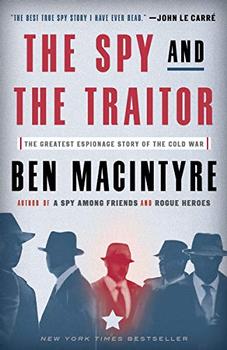Summary | Excerpt | Reviews | Beyond the Book | Readalikes | Genres & Themes | Author Bio

The Greatest Espionage Story of the Cold War
by Ben Macintyre
It seems probable that some of these enemies of the state were identified by Anton Gordievsky. "The NKVD is always right," he said: a conclusion both wholly sensible, and entirely wrong.
A second son, Oleg Antonyevich Gordievsky, was born on October 10, 1938, just as the Great Terror was winding down and war was looming. To friends and neighbors, the Gordievskys appeared to be ideal Soviet citizens, ideologically pure, loyal to Party and state, and now the parents to two strapping boys. A daughter, Marina, was born seven years after Oleg. The Gordievskys were well fed, privileged, and secure.
But on closer examination there were fissures in the family façade, and layers of deception beneath the surface. Anton Gordievsky never spoke about what he had done during the famines, the purges, and the terror. The older Gordievsky was a prime example of the species Homo Sovieticus, an obedient state servant forged by Communist repression. But underneath he was fearful, horrified, and perhaps gnawed by guilt. Oleg later came to see his father as "a frightened man."
Olga Gordievsky, Oleg's mother, was made of less tractable material. She never joined the Party, and she did not believe that the NKVD was infallible. Her father had been dispossessed of his watermill by the Communists; her brother sent to the eastern Siberian gulag for criticizing collective agriculture; she had seen many friends dragged from their homes and marched away in the night. With a peasant's ingrained common sense, she understood the caprice and vindictiveness of state terror, but kept her mouth shut.
Oleg and Vasili, separated in age by six years, grew up in wartime. One of Gordievsky's earliest memories was of watching lines of bedraggled German prisoners being paraded through the streets of Moscow, "trapped, guarded, and led like animals." Anton was frequently absent for long periods, lecturing the troops on Party ideology.
Oleg Gordievsky dutifully learned the tenets of Communist orthodoxy: he attended School 130, where he showed an early aptitude for history and languages; he learned about the heroes of Communism, at home and abroad. Despite the thick veil of disinformation surrounding the West, foreign countries fascinated him. At the age of six, he began reading British Ally, a propaganda sheet put out in Russian by the British embassy to encourage Anglo-Russian understanding. He studied German. As expected of all teenagers, he joined Komsomol, the Communist Youth League.
His father brought home three official newspapers and spouted the Communist propaganda they contained. The NKVD morphed into the KGB, and Anton Gordievsky obediently followed. Oleg's mother exuded a quiet resistance that only occasionally revealed itself in waspish, half-whispered asides. Religious worship was illegal under Communism, and the boys were raised as atheists, but their maternal grandmother had Vasili secretly baptized into the Russian Orthodox Church, and would have christened Oleg too had their horrified father not found out and intervened.
Oleg Gordievsky grew up in a tight-knit, loving family suffused with duplicity. Anton Gordievsky venerated the Party and proclaimed himself a fearless upholder of communism, but inside was a small and terrified man who had witnessed terrible events. Olga Gordievsky, the ideal KGB wife, nursed a secret disdain for the system. Oleg's grandmother secretly worshipped an illegal, outlawed God. None of the adults in the family revealed what they really felt—to one another, or anyone else. Amid the stifling conformity of Stalin's Russia, it was possible to believe differently in secret but far too dangerous for honesty, even with members of your own family. From boyhood, Oleg saw that it was possible to live a double life, to love those around you while concealing your true inner self, to appear to be one person to the external world and quite another inside.
Excerpted from The Spy and the Traitor by Ben Macintyre. Copyright © 2018 by Ben Macintyre. All rights reserved. No part of this excerpt may be reproduced or reprinted without permission in writing from the publisher.
Your guide toexceptional books
BookBrowse seeks out and recommends the best in contemporary fiction and nonfiction—books that not only engage and entertain but also deepen our understanding of ourselves and the world around us.